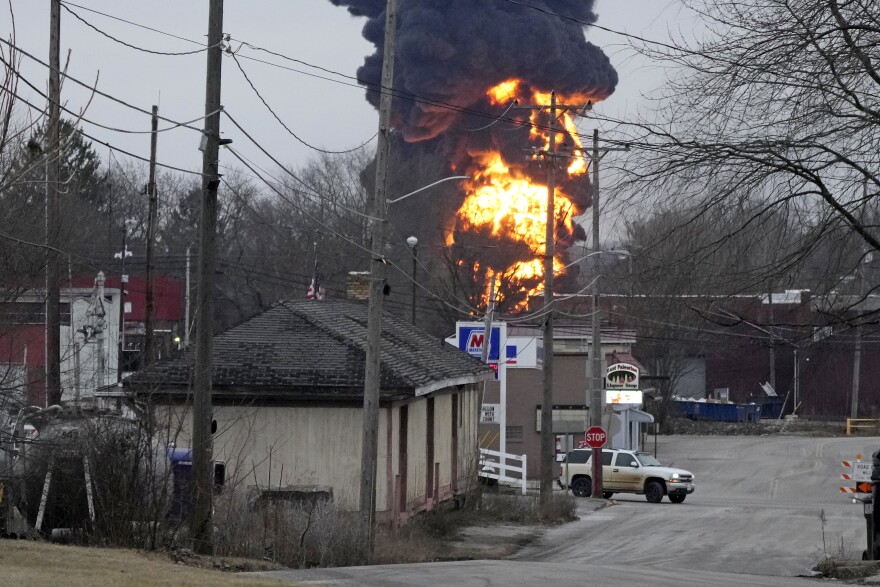East Palestine residents are showing up at local doctors’ offices with symptoms patients worry are a result of exposure to chemicals spilled during a train crash.
In the past two weeks, a few East Palestine patients each day have seen Dr. Alex Heintzelman, a family doctor in the city of Columbiana about 10 miles west of the spill.
“Most of the time we're seeing things like sore throats, headaches, nonproductive coughs," he said. "Then, just as common, is emotional loss of well-being. This has been very anxiety provoking for people — just a sudden upheaval in their lives that has been difficult to deal with.”
On Feb. 3, 50 cars of a train operated by Northfolk Southern derailed and caught fire near East Palestine, a community of approximately 5,000 people near the Ohio-Pennsylvania border.
Officials evacuated a one-mile by two-mile area surrounding the crash, and then on Monday performed a controlled release of the chemical vinyl chloride, which can cause cancer, to avoid a potential explosion. The rail company also reported cars were carrying ethylhexyl acrylate, ethylene glycol monobutyl ether and isobutylene – which the EPA lists as hazardous.
Residents have since been allowed to return to their homes.
Some people near the crash site are now requesting toxicology tests from their doctors, said Heintzelman. But, he added, he doesn't think the tests will provide the answers patients are looking for.
Doctors don't have the guidance or reference ranges for certain chemicals to interpret broad toxicology reports, Heintzelman said.
"That's just not something that I think our medical system is capable of doing right now," he said. "But certainly having a physical exam, recording a patient's story, treating symptoms as they arise that's definitely well within our abilities to do in primary care."
It's too soon to know if residents will face long-term health consequences from the crash, said Heintzelman, but people should see their doctor if they notice symptoms and to document their health status.
Officials have repeatedly said that the air around the crash site has continued to remain safe.
As of Wednesday, officials from the U.S. Environmental Protection Agency (EPA) have tested the air in more than 450 homes in the evacuation area. Testing efforts had not detected vinyl chloride or hydrogen chloride in the homes and the agency said that after the fire was extinguished on Feb. 8, the threat of the production of the gases phosgene and hydrogen chloride "no longer exists."
Phosgene is poisonous and hydrogen chloride can also be harmful, according to the Centers for Disease Control and Prevention (CDC).
The EPA said it has also sampled water in 21 wells. The results of that testing were not immediately available, but Ohio Gov. Mike DeWine said Wednesday that residents should drink bottled water until testing is complete out of "an abundance of caution."
Norfolk Southern is distributing bottled water at an assistance center located at the Abundant Life Church, 46469 State Route 46 in Waterford, according to the EPA. The rail company is also bringing bottled water into East Palestine, which the city will distribute as needed.
Dr. Heintzelman said many of his patients distrust officials and stressed that there needs to be continued transparency in order for his patients to feel they are safe.
“I hope that they can trust the things I tell them," he said. "I do think it's important for me to be upfront and say,'I don't know all of these answers right now, but I'm going to try to find information as it becomes available' and that we'll all walk alongside you while you're going through this and support you and in whatever ways that we can.”



